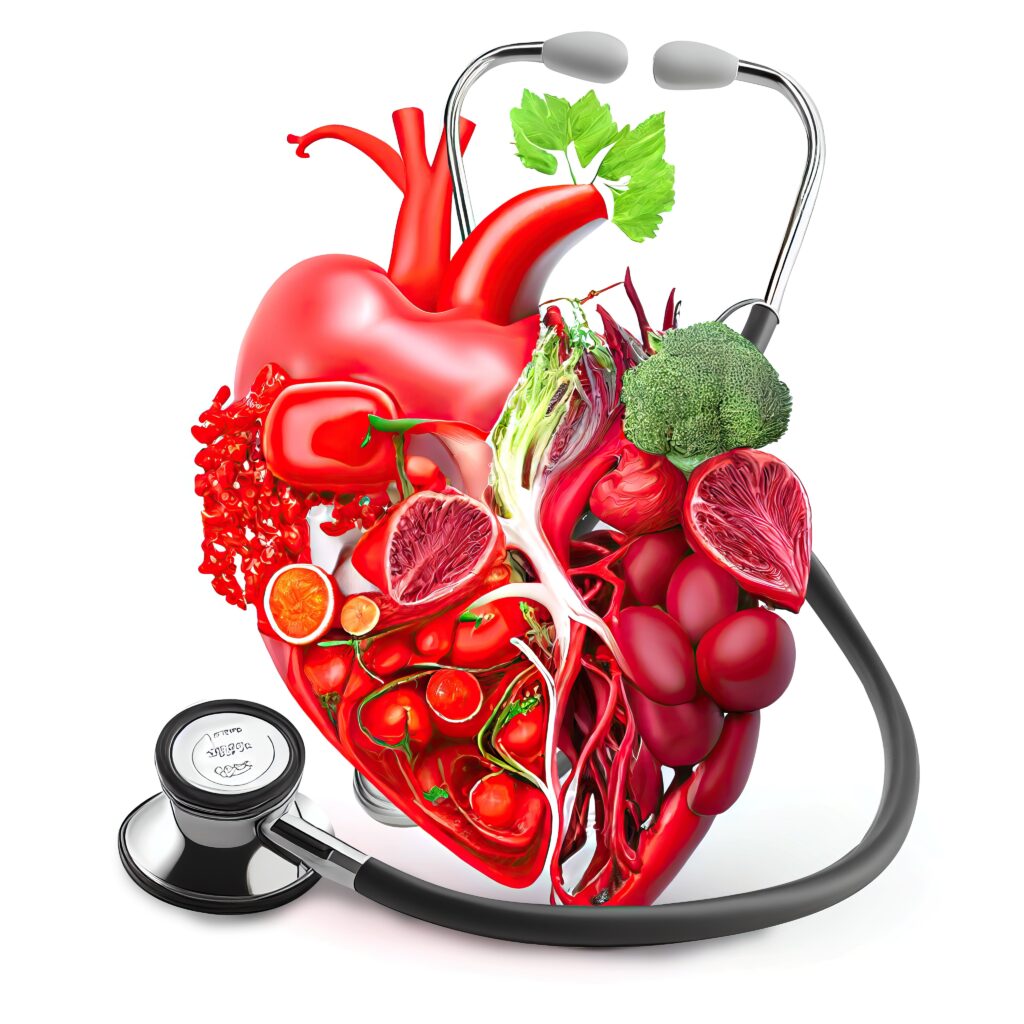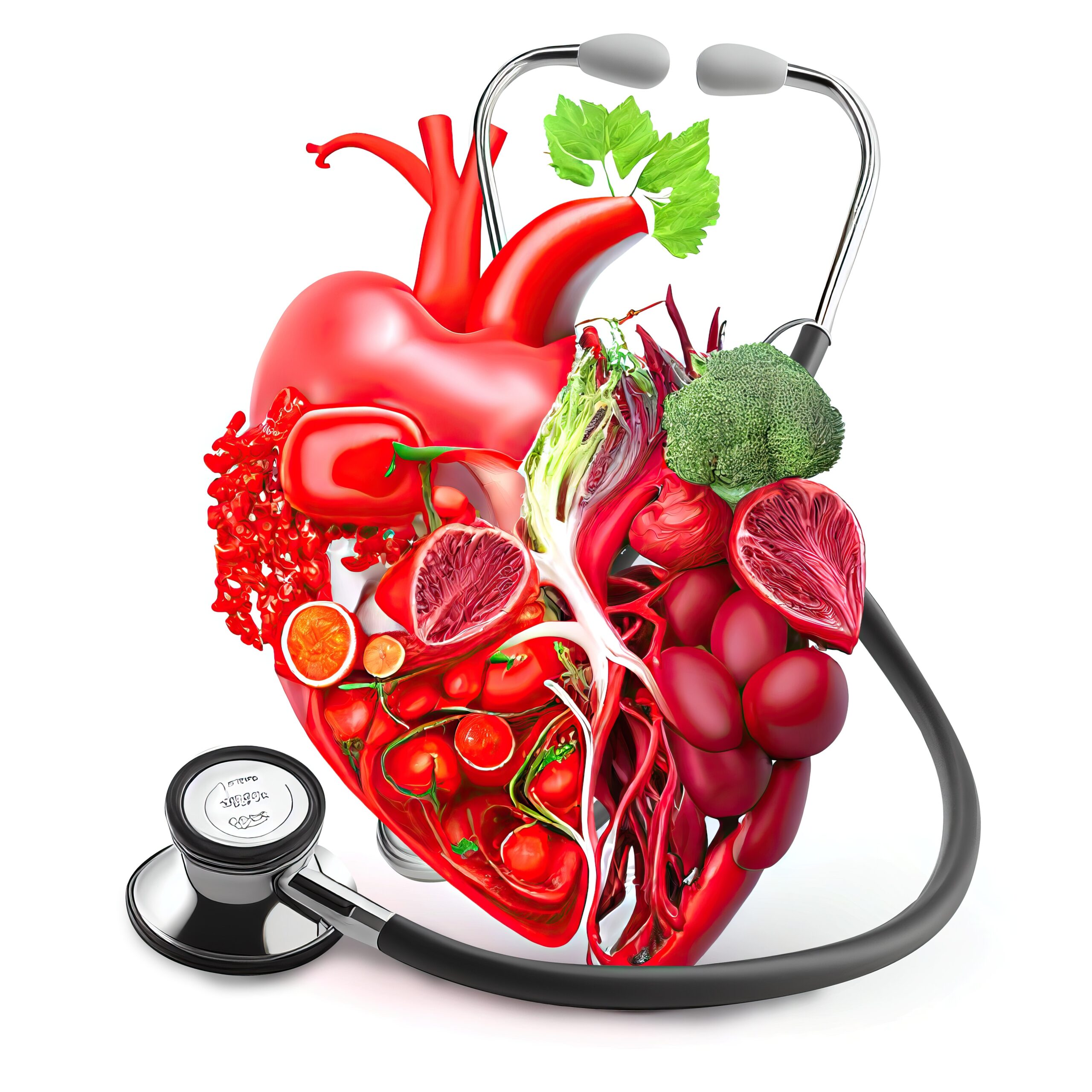Congestive Heart Failure Diet
If you’ve recently been diagnosed with heart failure, you may have a lot of questions about what happens next. Heart failure is a progressive condition, meaning it worsens over time, and there is no cure.
Although it’s a scary diagnosis to receive, most individuals with heart failure can manage their symptoms, slow the progression of their condition, and improve their quality of life with lifestyle modifications, in addition to medical management.
Learning how congestive heart failure and diet are related is essential for keeping your heart healthy. In this article, we will discuss the role of nutrition and what foods to eat and which to avoid.
What is Congestive Heart Failure?
Congestive heart failure is a condition in which the heart can not sufficiently pump the body’s blood supply. When the heart does not pump enough blood, this causes blood and fluid to accumulate in the lungs and lower body.
Common symptoms of CHF include:
- Shortness of breath
- Chest pain
- Fatigue
- Swelling/fluid retention, especially in legs and feet
- Coughing
Symptoms can range in severity and depend on the type of heart failure you have and the stage of heart failure you’re in. Individuals in the early stages often experience milder symptoms, while individuals in the late stages experience extreme fatigue, loss of appetite, and weight changes.
Having high blood pressure, elevated blood lipids, or a history of heart attack and/or coronary artery disease all increase your risk of developing congestive heart failure. Having heart failure also increases your risk of other health problems, including:
- Atrial fibrillation (Afib)
- Hypertension
- Heart attack
- Impaired liver and kidney function
- Malnutrition and cardiac cachexia, which is severe weight loss due to decreased heart function
Eating a heart healthy nutrient-sufficient diet, maintaining a healthy weight, and balancing blood sugar can help lessen these risks and complications.
I recently assisted a client who was in an advanced stage of heart failure and had already sustained multiple heart attacks. This client had also been diagnosed with high blood pressure, high cholesterol, and Afib, was taking a long list of medications, and had a defibrillator placed to monitor heart irregularities. Her related fatigue greatly impacted her quality of life.
I created a customized meal plan with the goals of correcting nutrient deficiencies, bringing down inflammation and insulin resistance, and optimizing heart function to reduce the risk of future complications.
After one month of working together, this client had no Afib episodes, her defibrillator never went off, and she was able to come off several of her blood pressure medications. She also gained her energy back and no longer needed daily naps. Fast forward a few more months and her cholesterol and blood sugar levels were optimized and her ejection fraction score increased by 20%.
The lesson here is that nutrition has the power to drastically improve heart health outcomes, even for individuals with heart failure.
Congestive Heart Failure and Diet
As you can see from the above client story, your diet can either improve or worsen heart failure symptoms. Here are several examples of nutrients and their relationship to heart failure.
Sodium
A high-sodium diet can increase blood pressure and fluid retention in heart failure. Sodium attracts water, so having too much sodium in your blood causes an increase in blood volume which can worsen the strain on your heart and cause more swelling.
Potassium
Getting the right amount of potassium is important for regulating heart rhythm and reducing the risk of Afib. Too little or too much potassium can interfere with heart rhythm and function.
Many individuals with heart failure are prescribed diuretics to manage fluid retention, which causes the body to lose potassium. However, some diuretics are potassium-sparing and prevent the loss of potassium. The amount of potassium you need from food should be optimized for heart health and personalized by a registered dietitian who specializes in heart disease.
Fluid
Taking in too much fluid from drinks and food can increase blood volume, worsen fluid retention, and strain the heart. Individuals with advanced heart failure usually are placed on fluid restrictions. A cardiovascular dietitian can guide you on how to keep track of fluid intake and stay within fluid restrictions.
Alcohol
Alcohol can elevate blood sugar and alter heart rate, both of which can complicate heart failure.
Refined grains and sugar
A diet high in carbohydrates and/or sugar increases your risk of insulin resistance, which results in high blood sugar levels and an increased risk of type 2 diabetes. High blood sugar contributes to elevated triglycerides, inflammation, and weight gain — all risk factors for heart complications.

Understanding CHF Diet
A heart failure diet includes nutrient-dense foods and minimizes foods and ingredients that can elevate your risk of heart failure complications and other risks to your cardiovascular health. A heart failure diet can also slow down the progression of heart failure and possibly improve your condition as well.
A 2018 study found individuals diagnosed with heart failure tend to be deficient in several vitamins and minerals, including vitamins A and D, calcium, magnesium, iodine, and selenium. That’s a sign that a lack of nutrient-dense foods in the diet is a contributing factor to the development and progression of heart failure.
Here are the primary goals of a diet for CHF:
- Eat a nutrient-sufficient diet to ensure you are consuming therapeutic amounts of cardio-protective nutrients to optimize your heart’s function and avoid heart failure-associated muscle loss. This includes a heart healthy diet that addresses inflammation, oxidative stress, and optimizes your laboratory parameters, like high cholesterol, high blood sugar, and high blood pressure, that can overburden your heart.
- Correct underlying micronutrient deficiencies
- Minimize fluid retention
- Maintain healthy blood pressure readings
- Promote a healthy weight
- Balance blood sugar
- Maintain electrolyte balance
- Reduce strain on the heart and lower heart disease markers, such as cholesterol, triglycerides, and inflammatory markers
Individual nutrition goals will vary depending on the person and stage of heart failure but may include daily calorie goals to support weight management, increasing fiber intake, following fluid restriction, and replacing unhealthy fats with healthy fat sources to support optimal triglyceride and cholesterol levels.
Foods to Avoid on a CHF Diet
Foods to avoid on a CHF diet include:
- Foods high in sodium
- Processed meats, including deli meats, hot dogs, sausages, and jerky
- Some canned foods, including soup, beans, and vegetables
- Store-bought broth/stock
- Salty snacks, such as chips, pretzels, crackers, salted nuts, etc.
- Condiments, such as soy sauce, mustard, relishes, salad dressings, and prepared marinades and sauces
- Foods packaged in brine, such as pickles, sauerkraut, and olives
- Vegetable/tomato juice
- Refined carbohydrates
- White bread
- White rice
- Pasta
- Biscuits, pizza dough, and other bread products made with all-purpose white flour
- Some cereals
- Added sugars
- Sugar sweetened drinks, such as soda and energy drinks
- Candy, baked goods, and other sweet desserts
- Sweetened cereals
- Foods high in saturated fat and trans fat
- Red meat
- Baked goods and pastries
- Fried foods
- Whole milk and other full fat dairy products
- Unhealthy fats, including butter, coconut oil, palm oil, shortening, lard, and margarine
- Alcohol
Foods to Eat on a CHF Diet
The foods to eat on a heart failure diet are similar to other heart healthy diets. The foundation of a CHF diet should include:
- A variety of fruits and vegetables, which are a good source of vitamins, minerals, fiber, and antioxidants.
- Fiber is important for blood sugar control. Fiber passes through the digestive system slowly, which helps curb blood sugar spikes. Fiber also binds cholesterol and removes it from the body, which helps promote optimal blood cholesterol levels. It is important to consume both insoluble and soluble types of fiber.
- Antioxidants help combat inflammation and oxidative stress, both of which contribute to the development of cardiovascular disease.
- Lean animal protein, including skinless poultry, eggs, and fish
- Beans and lentils
- Whole grains
- Oats
- Brown rice
- Quinoa
- Products made with whole wheat flour or other whole grains
- Reduced fat milk and yogurt
- Healthy fats should be eaten in moderation. Although healthy fats support heart health, they can become high saturated fat foods which may make it harder for your heart to do its job.
Examples include:
- Olive oil
- Avocado
- Nuts and seeds
- Herbs, spices, and low sodium foods and condiments
- A variety of fresh and dried herbs can be used to flavor food in place of table salt.
- Balsamic vinegar and olive oil make a good replacement for bottled salad dressings.
- Learn to make your own condiments if you can’t find a low sodium option so you can control the amount of salt.
Not all packaged foods are off-limits on a heart failure diet. Some store-bought items can still be used occasionally for convenience, as long as you look for low sodium, nutrient dense options.
Bottom Line
Making necessary diet and lifestyle changes following a heart failure diagnosis can help manage CHF symptoms and reduce the risk of further complications. As a cardiovascular dietitian, I can create a personalized plan and provide guidance to help you improve your eating habits so you can enjoy a higher quality of life.
Take the first step and schedule your complimentary 15-minute consultation. We’ll discuss your heart health goals and I’ll advise you on how I can best serve your needs through either individual or group counseling.
References
- Malik A, Brito D, Vaqar S, et al. Congestive Heart Failure. StatPearls. 2023. Available at: https://www.ncbi.nlm.nih.gov/books/NBK430873/
- Billingsley HE, Hummel SL, Carbone S. The role of diet and nutrition in heart failure: A state-of-the-art narrative review. Prog Cardiovasc Dis. 2020;63(5):538-551. doi:10.1016/j.pcad.2020.08.004
- Chrysohoou C, Mantzouranis E, Dimitroglou Y, Mavroudis A, Tsioufis K. Fluid and Salt Balance and the Role of Nutrition in Heart Failure. Nutrients. 2022;14(7):1386. Published 2022 Mar 26. doi:10.3390/nu14071386
- Cascino TM, Hummel SL. Nutrient Deficiencies in Heart Failure: A Micro Problem With Macro Effects?. J Am Heart Assoc. 2018;7(17):e010447. doi:10.1161/JAHA.118.010447
- Szczepańska E, Białek-Dratwa A, Janota B, Kowalski O. Dietary Therapy in Prevention of Cardiovascular Disease (CVD)-Tradition or Modernity? A Review of the Latest Approaches to Nutrition in CVD. Nutrients. 2022;14(13):2649. Published 2022 Jun 27. doi:10.3390/nu14132649
- Wickman BE, Enkhmaa B, Ridberg R, et al. Dietary Management of Heart Failure: DASH Diet and Precision Nutrition Perspectives. Nutrients. 2021;13(12):4424. Published 2021 Dec 10. doi:10.3390/nu13124424
